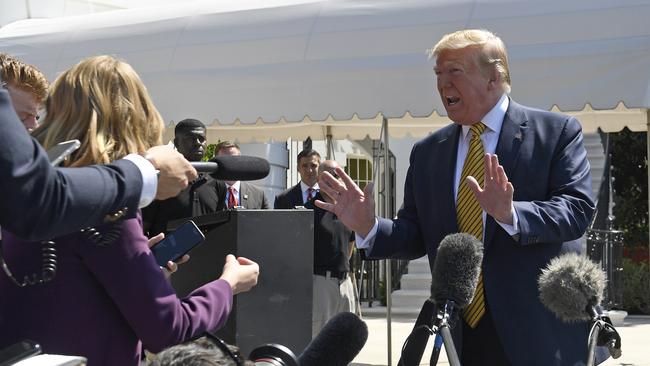Trump on the edge of a war he doesn’t want
After stoking anti-war sentiment, the president has now left himself limited options on Iran.

At the rally this week officially kicking off his re-election campaign, President Trump boasted that he withdrew the U.S. from the “disastrous Iran deal and imposed the toughest ever sanctions” on Tehran. In the very next passage of his speech, he declared that he is “starting to remove a lot of troops” from the Middle East because “great nations do not want to fight endless wars.” That juxtaposition explains the awkward position in which the president now finds himself: He is at the edge of a war with Iran he doesn’t actually want, and for which there is a limited domestic constituency, in part because he has stoked anti-war sentiment within his own Republican Party. The paradox led him to authorise a retaliatory military strike against Iran Thursday night, and then pull it back at the last minute.
For two years, Mr. Trump has tried to have it both ways: He has gambled that he could withdraw from the nuclear deal with Iran struck by his predecessor and generate unprecedented economic pressure on Iran, yet do so without causing Iran to strike back violently. The hope has been that Iran would respond not with military escalation but by agreeing to renegotiate the nuclear agreement and broaden it to include limits on both missiles and support for Iranian proxy forces around the region.
Mr. Trump’s more hawkish advisers — including national security adviser John Bolton and Secretary of State Mike Pompeo — have always appeared ready to deal with the consequences if Iran reacted with violence instead of diplomacy. Mr. Trump has never seemed quite as comfortable with the downside risks.
And for good reason. A key component of Mr. Trump’s presidential campaign, in which he ran against the Republican establishment nearly as hard as he ran against the Democrats, was his willingness to decry his own party’s record of sliding into Middle Eastern wars. Candidate Trump calculated, probably accurately, that the broad middle of the country was weary and wary after three major wars in the Middle East — in Iraq in both 1990 and 2003, and in Afghanistan in 2001. The notion that he was a different kind of Republican candidate, leading a significantly changed party, was built in no small measure on this position.
Along the way, he has led thousands of Trump supporters to cheer the idea that he would bring troops home from the Middle East, rather than send more there. He also has empowered elements within his party that share his distaste for new conflicts. Sen. Rand Paul of Kentucky, a frequent confidante of the president, is the leading example in the Senate, where just this week he led a charge to block arms sales to Saudi Arabia — sales that appeared designed mostly to help Saudi Arabia prepare for a potential conflict with Iran.
Meanwhile, on the other side of the aisle, Democrats are essentially united in their belief that the nuclear deal was and is the way to keep Iran contained, so there is little chance of gaining support there for a military confrontation. Thus, the constituency most likely to back a war with Iran, at least for now, appears to lie within one part of one party.
Oddly, Mr. Trump may now be in a standoff with an Iranian leadership that actually shares both his diffidence and his desire for confrontation without conflict.
Iran appears to feel that it needs to strike out in some fashion, both to show it isn’t simply succumbing to American economic pressure and to try to scare the rest of the world into providing some economic relief. Yet until this week, it appeared that Iran was going to measure its actions carefully, to avoid drawing Mr. Trump into a fight neither side wants. Iranian forces apparently struck several oil tankers in the Persian Gulf region, but no American ships, and with no American casualties.
Trump aides appeared ready to live with the fact Iran might take such actions so long as no Americans died and no American facilities were hit. Officials believe that the economic pressure on Iran has only begun to start biting, and that the wisest course is simply to let the pain spread in coming months before reaching a decision on whether it is moving Iran into talks and concessions.
The question is whether Iran’s downing of an American military drone this week represented a move outside these mutually understood boundaries, or simply a miscalculation. Mr. Trump appeared ready this week to believe it might have been a miscalculation. He noted that no Americans died — and suggested he had pulled back from an American military response precisely because he didn’t want any Iranians to die, either.
So the lines the two sides have drawn may remain intact, left in place by a president who isn’t actually eager for a war.
— The Wall Street Journal



To join the conversation, please log in. Don't have an account? Register
Join the conversation, you are commenting as Logout